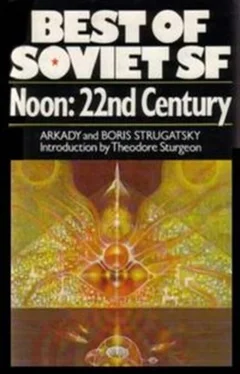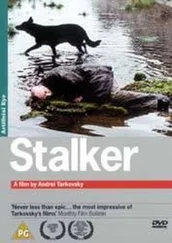“Why not?”
“The fact is that it’s very hard to catch this ignis fatuus. Like Truth, it flickers in the distance and refuses to be apprehended. Lepelier tried to construct a cybernetic system to hunt it down, but nothing came of it.”
Teacher Tenin’s head ached unbearably. He felt awful. In the past four hours he had read and mastered four books on atmosphere regeneration, and had memorized the Venus plan. He had been forced to resort to the hypnoteacher for this, and after the hypnoteacher it was absolutely essential to lie down and sleep it off. But he couldn’t. Perhaps he should not have overloaded his brain that way, but the teacher did not want to take chances. He had to know ten times more about Venus and about the project than the four of them put together. Otherwise his plan wasn’t worth wasting time on.
Waiting for the moment to turn to the attack, he told them about the search for ignis fatuus, and he saw their childish eyes open wide, and saw the flame of great imagination writhe and flare in them, and as always it felt surprisingly gladdening and good to see this, even though his head was splitting into pieces.
But the boys were already sloshing through a marsh, wearing real, entrancing swamp boots, and around them were night, darkness, fog, and mysterious thickets; and from the depths of the swamp rushed clouds of repulsive exhalations, and it was very dangerous and frightening, but you mustn’t be afraid. In front flickered the bluish tongues of ignis fatuus, whose secret—as was now clear—it was vital to discover, and on the chest of each of the hunters hung a miniaturized control for the trusty agile cybers who were stumbling through the quagmire. And these cybers had to be invented quickly, immediately, or else the last swamps would be drained and everyone would be left looking like fools.
By the time that the pants and the transparency system had been put into shape, no one cared any more about either. Pol was musing on a poem to be called “Will o’ the Wisp,” and while pulling on his pants he uttered the first line to flow out of him: “Mark! In the dark—The swampfire’s glimmering spark!” The Captain and Athos, independently of each other, cogitated upon the design of a swamp cyber suitable for rapid locomotion through marshy regions, and reacting to chemiluminescence. Lin simply sat with his mouth open and thought, Where were my eyes? How about that! He firmly resolved to devote the rest of his life to swamps.
The teacher thought, It’s time. Just so I don’t force them to lie or dissemble. Forward, Tenin! And he began, “Speaking of diagrams, Captain Komov, what is this misshapen thing?” He tapped the diagram of the extractor with his finger. “You distress me, lad. The idea is good, but the execution is highly unsuccessful.”
The Captain flared up and rushed into battle.
At midnight Teacher Tenin came out into the park and stopped by his pterocar. The enormous flat block of the school lay before him. All the windows on the first floor were dark, but above, some lights were still on. There was light in Room 20, where the five noted scoffers must be having a discussion with their teacher Sergei Tomakov, a former doctor. There was light in Room 107, where shadows were moving and it was clear that somebody was hitting somebody else over the head with a pillow, and intended to go on hitting him until the inaudible and invisible stream of infrarays forced even the most restless to go to sleep, which would happen in two minutes. There was light in many of the rooms of the oldest pupils—they were working on problems a little more important than ignis fatuus or how to put back together a torn pair of tetraconethylene pants. And there was light in Room 18.
The teacher got into the pterocar and began to watch the familiar window. His head raged on. He wanted to lie down and close his eyes, and put something cold and heavy on his forehead. Well, my boys, he thought. Have I really stopped you? Oh, how hard it is, what a burden. And I’m not always sure whether I’m right, but in the end I’ve always turned out to be. And how remarkable that is, and how wonderful, and I couldn’t live without it.
The light in Room 18 went out. So he could go to sleep. He felt sleepy, but also sorry. I probably didn’t tell them everything I could have and should have. No, I did too. I wish it were morning! I feel bored without them, and lonely. Crummy little kids! Teacher Tenin smiled and turned on the engine. He wished it were morning.
In Room 18, courageously fighting off sleep, the Captain was delivering a speech. The crew kept silent.
“Disgraceful! Showed up everyone! You lousy spongers! You miserable collection of slowboats and ignoramuses! What have you been doing for forty days? You, Lin? Shame on you! Not one intelligent answer.”
Athos, playing with the transparency controls, muttered, “Cut the nagging, Captain! You’re one to talk—out of five questions you missed four. And on the fifth—”
“What do you mean, out of five—”
“Don’t argue, Captain, I counted.”
If Athos said he had counted, that was it. Good grief, how disgraceful! The Captain screwed his eyes up to the point where he saw spots before his eyes. Operation October had failed. Had collapsed disgracefully. You couldn’t storm Venus with this bunch of ignoramuses. No one had understood anything or learned anything. How much there was to cram about atmospheric assemblies, damn it all! We’re not ready to go anywhere. The great colonists from Room 18—ha!
But Walter had really gotten his. Should they hand out some more? No, that was enough. And enough of all this nonsense in general. It was time to think about ignis fatuus.
… The Captain was sloshing through the swamp, together with Athos and Lin and Polly, who was wearing tattered pants. Amid the hazy exhalations flashed the quick-moving cybers, which they still had to invent.
Novosibirsk, 8 October 2021. It was announced here today that the commission of the USCR Academy of Sciences studying the results of the Taimyr-Ermak expedition has finished its work.
As is well known, in pursuance of the international program of research into deep space and into the possibility of interstellar travel, in 2017 the Academy of Sciences of the USCR sent into deep space an expedition consisting of the two first-line interplanetary craft Taimyr and Ermak . The expedition departed November 7,2017, from the international spaceport Pluto-2, in the direction of the constellation Lyra. The crew of the spaceship Taimyr consisted of captain and expedition head A. E. Zhukov, engineers K. I. Falin and G. A. Pollack, navigator S. I. Kondratev, cyberneticist P. Koenig, and physician E. M. Slavin. The spaceship Ermak served as an unmanned data collector.
The purpose of the expedition was to attempt to approach the light barrier (an absolute velocity of 300 thousand kilometers per second), and to perform research in proximity to the light barrier into the characteristics of space-time under arbitrary changes of velocity.
On 16 May 2020, the unmanned craft Ermak was detected and intercepted near the planet Pluto on its return orbit, and was brought to the international spaceport Pluto-2. The spaceship Taimyr did not appear on its planned return orbit.
A study of the data obtained by the spacecraft Ermak has demonstrated, in part, the following:
a) On the 327th day, subjective time, the Taimyr-Ermak expedition attained a velocity of 0.957 absolute relative to the sun, and turned to the execution of the research program; b) The expedition obtained, and the receiving devices on the Ermak recorded, extremely valuable data relating to the behavior of space-time under conditions of arbitrary changes of velocity in proximity to the light barrier; c) On the 342nd day, subjective time, the Taimyr initiated planned maneuvers bringing its distance from the Ermak up to 900 million kilometers. At 13 hours 09 minutes 11.2 seconds of the 344th day, subjective time, the tracking equipment on the Ermak detected, at the location of the Taimyr, a bright flash, after which the data flow from the Taimyr to the Ermak ceased, and was not resumed.
Читать дальше












